
Antimicrobial Dosing Concepts in Patients with Reduced Kidney Function (2560)
Antimicrobial Dosing Concepts in Patients with Reduced Kidney Function (2560)
ผู้เขียนบทความ: ผู้ช่วยศาสตราจารย์ ดร. ภก. วีรชัย ไชยจามร
บทคัดย่อ:
การใช้ยาต้านจุลชีพสำหรับการรักษาภาวะติดเชื้อ จำเป็นต้องพิจารณาจากปัจจัยหลายด้าน ทั้งจากยาต้านจุลชีพและสภาวะผู้ป่วย เชื้อก่อโรค รวมถึงบริเวณที่ติดเชื้อ ในอดีต ปัจจัยสำคัญที่เป็นตัวกำหนดในการเลือกยาต้านจุลชีพได้แก่ เชื้อก่อโรค ค่า minimum inhibitory concentration (MIC) และความไวของเชื้อ (in vitro antimicrobial susceptibility patterns) แต่การพิจารณาจากปัจจัยดังกล่าวข้างต้นยังไม่เพียงพอในการดูแลผู้ป่วยภาวะติดเชื้อให้เหมาะสมและมีประสิทธิภาพ ปัจจัยอื่นที่ต้องพิจารณาร่วมด้วยคือ การมีระดับยาที่เพียงพอในบริเวณที่เกิดภาวะติดเชื้อ (infection site) และพยาธิสภาพของผู้ป่วยที่ส่งผลต่อเภสัชจลนศาสตร์และเภสัชพลศาสตร์ของยาต้านจุลชีพที่เลือกใช้ เพื่อให้เกิดผลลัพธ์ในการรักษาที่ดี คือ การหายจากภาวะติดเชื้อ การป้องกันการเกิดเชื้อดื้อยา และผู้ป่วยไม่เกิดพิษจากการได้รับยาต้านจุลชีพในขนาดที่ไม่เหมาะสม
คำสำคัญ:
Link to Academic article: Antimicrobial Dosing Concepts in Patients with Reduced Kidney Function
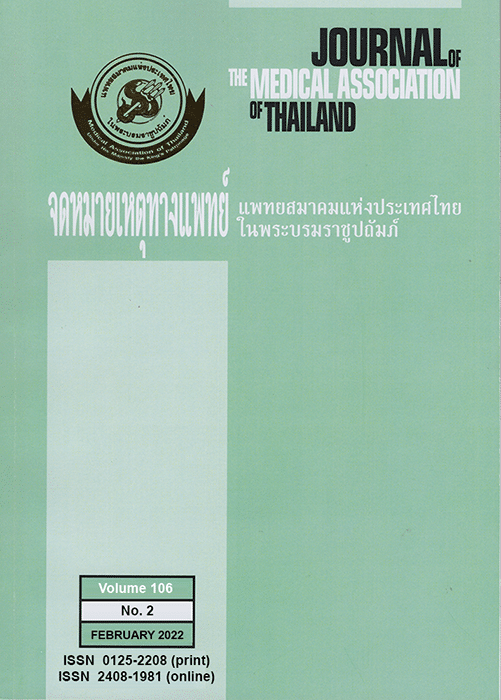
Diagnostic performance of reagent strip testing for antenatal screening of asymptomatic bacteriuria using single- and double-urine culture criteria (2017)
Title : Diagnostic performance of reagent strip testing for antenatal screening of asymptomatic bacteriuria using single- and double-urine culture criteria
Researcher : Kovavisarach, E., Romyen, S., Kanjanahareutai, S.
Abstract : Objective: To determine the prevalence of asymptomatic bacteriuria (ABU) in pregnant women and diagnostic performance of reagent strip test for screening of ABU using single and double urine culture criteria.
Material and Method: Pregnant women attending their first antenatal care at Rajavithi Hospital Bangkok, between August 22 and November 4, 2011 were enrolled to collect clean-catch midstream urine for reagent strip test and culture on blood and MacConkey agar plates. The second urine culture was collected only from participants who had the first positive urine culture.
Results: Sixty-one of the 754 cases (8.1%) got the positive first urine culture. Twenty of the sixty-one cases were still positive urine culture in the second culture. Therefore, prevalence of ABU was 8.1% and 2.7% using single and double urine culture as gold standard. Escherichia was the most common pathogen in both single and double urine culture (27.9% and 40%, respectively). The urine dipstick nitrite, leukocyte, and both test by using double urine culture had a sensitivity of 35.0%, 50.0%, and 20.0%, specificity of 86.5%, 52.2%, and 93.2%, positive predictive value (PPV) of 6.6%, 2.8%, and 7.4%, and negative predictive value of 98.0%, 97.5%, and 97.7%, respectively. All diagnostic performances of double-urine culture were comparable with single-urine culture except marked worse PPV.
Conclusion: Prevalence of ABU in pregnant women was decreased from 8.1 to 2.7% using single and double culture as gold standard. Reagent strip testing is not sensitive for screening of ABU; either single or double urine culture were used as gold standard.
Keywords: Asymptomatic bacteriuria, Pregnancy, Reagent strip, Single urine culture, Double urine culture
Link to Academic article: http://www.jmatonline.com/index.php/jmat/article/view/7049
Journal : Journal of the Medical Association of Thailand, 2017, 100(10)
Bibliography : Kovavisarach, E., Romyen, S., & Kanjanahareutai, S. (2017). Diagnostic performance of reagent strip testing for antenatal screening of asymptomatic bacteriuria using single- and double-urine culture criteria. Journal of the Medical Association of Thailand, 100(10), 1045–1049.
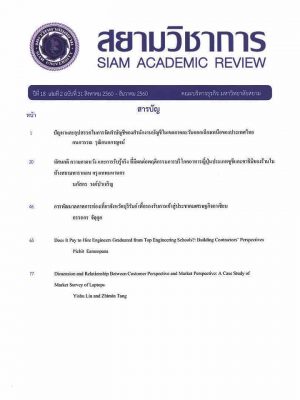
Does It Pay to Hire Engineers Graduated from Top Engineering Schools?: Building Contractors’ Perspectives (2017)
Pichit Eamsopana. (2017). Does It Pay to Hire Engineers Graduated from Top Engineering Schools?: Building Contractors’ Perspectives. Siam Academic Review, 18(2), 65-76.
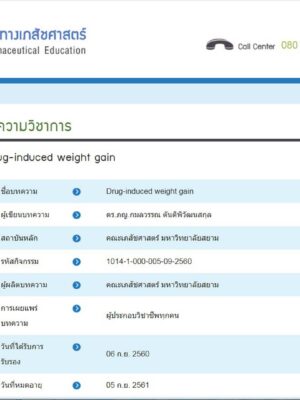
Drug-induced weight gain (2560)
Drug-induced weight gain (2560)
ผู้เขียนบทความ: ดร.ภญ.กมลวรรณ ตันติพิวัฒนสกุล
บทคัดย่อ:
Weight gain (ภาวะน้ำหนักตัวเพิ่มขึ้น) เป็นภาวะที่เกิดขึ้นทั้งจากปัจจัยทางพันธุกรรมและสิ่งแวดล้อม บ่งบอกถึงความไม่สมดุลของจำนวนพลังงานที่รับเข้าสู่ร่างกายต่อวัน และที่ถูกเผาผลาญไป เป็นสิ่งสะท้อนถึงการดำเนินชีวิตประจำวัน และบางครั้งก็เป็นผลไม่พึงประสงค์ที่เกิดขึ้นจากการใช้ยา นำไปสู่ภาวะน้ำหนักเกิน หรือโรคอ้วนซึ่งมีผลต่อสุขภาพที่จะตามมาอีกหลายโรค เช่น ความดันโลหิตสูง เบาหวาน โรคหัวใจและหลอดเลือด เมื่อพิจารณาข้อมูลทางระบาดวิทยา จากแนวทางของ The national institutes of health กำหนดให้ ค่า body mass index (BMI) ที่มากกว่า 25 ถือว่าเป็นภาวะน้ำหนักตัวเกิน และถ้ามากกว่า 30 ถือว่าเป็นโรคอ้วน (เกณฑ์สำหรับประชากรในเอเชีย จะใช้ค่าที่มากกว่า 22.9 ถือว่าน้ำหนักตัวเกิน และค่าที่มากกว่า 25 ถือว่าเป็นโรคอ้วน) ในประเทศสหรัฐอเมริกา จะพบว่า ประชากรประมาณร้อยละ 35.5 กำลังอยู่ในภาวะน้ำหนักเกินและโรคอ้วน องค์การอนามัยโลกรายงานข้อมูลของประเทศในกลุ่มเอเชียตะวันออกเฉียงใต้ว่า ประเทศมาเลเซีย มีประชากรผู้ใหญ่ที่มี BMI มากกว่า 25 มีจำนวนถึงร้อยละ 44.2 และ BMI มากกว่า 30 มีจำนวนถึงร้อยละ 14 และประเทศไทยรองลงมาคือ มีประชากรผู้ใหญ่ที่มี BMI มากกว่า 25 มีจำนวนถึงร้อยละ 32.2 และ BMI มากกว่า 30 มีจำนวนถึงร้อยละ 8.8 ตามลำดับ นับว่าเป็นประเด็นทางสาธารณสุขที่กำลังวิกฤตอยู่ในขณะนี้
คำสำคัญ:
Link to Academic article: Drug-induced weight gain
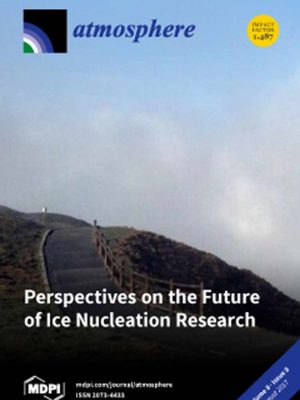
Impacts of Climate Change on Rainfall Erosivity in the Huai Luang Watershed (2017)
Title : Impacts of Climate Change on Rainfall Erosivity in the Huai Luang Watershed
Researcher : Pheerawat Plangoen and Parmeshwar Udmale
Department : Department of Civil Engineering, Faculty of Engineering, Siam University, Bangkok, Thailand
Email : pheerawat.pla@siam.edu
Abstract : This study focuses on the impacts of climate change on rainfall erosivity in the Huai Luang watershed, Thailand. The multivariate climate models (IPCC AR5) consisting of CCSM4, CSIRO-MK3.6.0 and MRI-CGCM3 under RCP4.5 and RCP8.5 emission scenarios are analyzed. The Quantile mapping method is used as a downscaling technique to generate future precipitation scenarios which enable the estimation of future rainfall erosivity under possible changes in climatic conditions. The relationship between monthly precipitation and rainfall erosivity is used to estimate monthly rainfall erosivity under future climate scenarios. The assessment compared values of rainfall erosivity during 1982–2005 with future timescales (i.e., the 2030s, 2050s, 2070s and 2090s). The results indicate that the average of each General Circulation Model (GCM) combination shows a rise in the average annual rainfall erosivity for all four future time scales, as compared to the baseline of 8302 MJ mm ha−1 h−1 year−1, by 12% in 2030s, 24% in 2050s, 43% in 2070s and 41% in 2090s. The magnitude of change varies, depending on the GCMs (CCSM4, CSIRO-MK3.6.0, and MRI-CGCM3) and RCPs with the largest change being 82.6% (15,159 MJ mm ha−1 h−1 year−1) occurring under the MRI-CGCM3 RCP8.5 scenario in 2090s. A decrease in rainfall erosivity has been found, in comparison to the baseline by 2.3% (8114 MJ mm ha−1 h−1 year−1) for the CCSM4 RCP4.5 scenario in 2030s and 2.6% (8088 MJ mm ha−1 h−1 year−1) for the 2050s period. However, this could be considered uncertain for future rainfall erosivity estimation due to different GCMs. The results of this study are expected to help development planners and decision makers while planning and implementing suitable soil erosion and deposition control plans to adapt climate change in the Huai Luang watershed.
Key words : climate change; rainfall erosivity; precipitation; soil erosion; sedimentation
Link to article : Atmosphere Vol.8 No.8 Aug 2017, pp.1-18. https://doi.org/10.3390/atmos8080143
Journal : Atmosphere / in Scopus
Bibliography : Pheerawat Plangoen & Parmeshwar Udmale. (2017). Impacts of Climate Change on Rainfall Erosivity in the Huai Luang Watershed. Atmosphere, 8(8), 1-18. https://doi.org/10.3390/atmos8080143
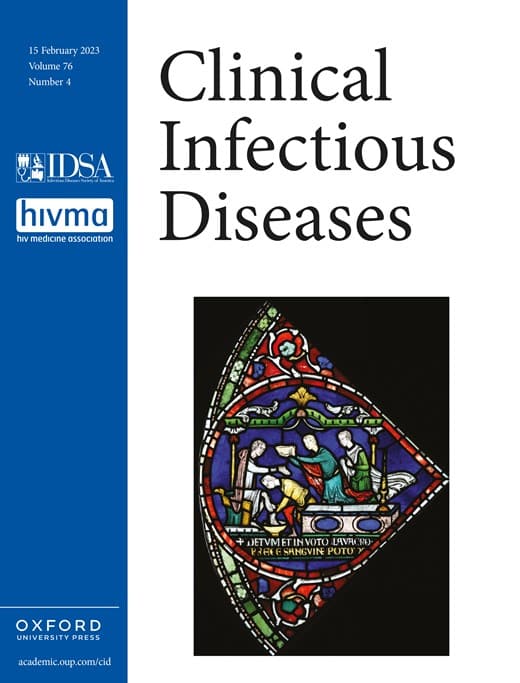
Infection prevention and control in Asia: Current evidence and future milestones (2017)
Title : Infection prevention and control in Asia: Current evidence and future milestones
Researcher : Apisarnthanarak, A., Mundy, L.M., Tantawichien, T., Leelarasamee, A.
Abstract : The Asia-Pacific region is a geographic source for emerging infectious diseases, including multidrug-resistant (MDR) organisms (MDROs) and pathogens with pandemic potential. Risks for emerging infectious diseases in this geographic region are complex and are presumed to include ecological, socioeconomic, and technological processes favorable to microbial transmission dynamics. In resource-limited settings, relative to resource-adequate settings, there continues to be a paucity of data in support of infection prevention and control, and patient safety interventions to ensure that regional, if not national, healthcare systems work effectively to improve infection prevention and control interventions. In addition, several viral pandemics and annual influenza strains have originated in the Asia-Pacific region, which, together, has global implications for population health.
Keywords: infection prevention, Asia, Asia Pacific, resource-limited setting, healthcare associated infections
Link to Academic article: https://academic.oup.com/cid/article/64/suppl_2/S49/3782667
Journal : Clinical Infectious Diseases, 2017, 64(Supplement 2).
Bibliography : Apisarnthanarak, A., Mundy, L.M., Tantawichien, T., & Leelarasamee, A. (2017). Infection prevention and control in Asia: Current evidence and future milestones. Clinical Infectious Diseases, 64(Supplement 2), S49–S50.

Maternal and neonatal outcomes of parturients with or without amniotomy for augmentation of labor (2017)
Title : Maternal and neonatal outcomes of parturients with or without amniotomy for augmentation of labor
Researcher : Thirawat, S., Kovavisarach, E.
Abstract : Objective: To determine the maternal and neonatal outcomes of the low-risk term pregnancies with or without amniotomy for augmentation of labor.
Material and Method: A retrospective cohort study of term pregnant women in cephalic presentation with labor pain who delivered in Rajavithi Hospital between January 1 and December 31, 2014 was conducted. Those parturients whose membranes were ruptured by amniotomy were study cases and those whose amniotomy were not performed and delivered immediate after the study cases were assigned as the control cases.
Results: Five hundred ninety eight women with uncomplicated pregnancy were enrolled and divided equally into two groups, one of 299 cases with amniotomy and another 299 cases without amniotomy. The present study showed that pregnant women in amniotomy group had a significantly higher rate of cesarean delivery (p<0.001) and birth asphyxia (p = 0.002). The duration of labor, maternal complications, and neonatal complications were not significantly different between the two groups.
Conclusion: Rate of cesarean delivery and birth asphyxia were significantly higher in the amniotomy group compared with the non-amniotomy group.
Keywords: Amniotomy, Duration of labor, Cesarean delivery, Neonatal outcome, Uncomplicated pregnancy
Link to Academic article: http://www.jmatonline.com/index.php/jmat/article/view/8451
Journal : Journal of the Medical Association of Thailand, 2017, 100(11)
Bibliography : Thirawat, S., & Kovavisarach, E. (2017). Maternal and neonatal outcomes of parturients with or without amniotomy for augmentation of labor. Journal of the Medical Association of Thailand, 100(11), 1156–1161.
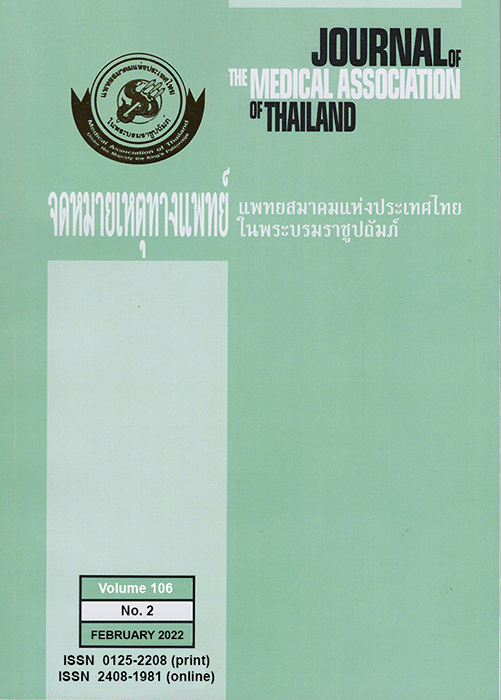
Need for internal medicine subspecialists in Thailand (2017)
Title : Need for internal medicine subspecialists in Thailand
Researcher : Leelarasamee, A., Intragumtornchai, T., Pannarunothai, S., …Krittayaphong, R., Bowonwatanuwong, C.
Abstract : Background: Matching supply side of the Internal Medicine (IM) subspecialists to the demand for complex medical care at referral medical centers would lead to more efficient health system management and ultimately optimal clinical outcome. The second decade of the universal health coverage policy in Thailand has raised the awareness on how to reach equitable utilization goals of good quality medical services, while barriers of accession have been removed. More accurate evidence-based human resource planning is timely needed.
Objective: To estimate the number of the ten subspecialists in internal medicine (neurologist, cardiologist, endocrinologist, gastroenterologist and hepatologist, nephrologist, hematologist, oncologist, rheumatologist, pulmonologist, and infectious disease specialist) needed for complex medical care based on the workload in the year 2013.
Material and Method: The present study applied a needs assessment model with evidence-based approach. Claimed data of inpatients in the year 2013 from the three government insurance schemes (the Civil Servant Medical Benefit, the Social Security and the Universal Health Coverage schemes), and out-patient data from Universal Coverage System were used to estimate demand for subspecialists. The Human Resource Working Group of the Royal College of Physicians of Thailand agreed on the conceptual framework to estimate the need for ten subspecialists based on clinical activities of outpatient consultations, inpatient ward rounds and non-operating room procedures on medical cases of respective diagnosis related group with severe and catastrophic comorbidities and complications by the Thai-DRG version 5. Representatives from the Associations of IM subspecialties approved the lists of ICD-10 diagnosis and ICD-9-CM procedure codes specific to each subspecialist care and proposed assumptions on rates of consultations from other specialists. Surveys were done to subspecialists in 6 major provincial clusters and representatives from IM subspecialty Associations asking time spent on main activities of patient care. The number of full-time-equivalent (FTE) subspecialists needed was calculated by multiplying the clinical workloads measured in minutes spent for each activity (ward round, ward work, inpatient and outpatient consultations) to get the total time needed, then divided by the available time for clinical activity of one subspecialist.
Results: From 5.9 million inpatient discharges in the year 2013, primary responsibility of patients in respective severe and catastrophic DRGs related to specific subspecialist workloads were summed up for teaching hospitals and regional hospitals ranging from as lowest the 2,849 cases for rheumatology to the highest 24,610 cases for gastroenterology and hepatology. The number of inpatient non-operating room procedures by ICD-9-CM as listed by IM subspecialty Associations ranged from 8 times for endocrinologists to 22,927 times for cardiologists for the whole year. Of ten subspecialists, the estimated numbers of cardiologist, nephrologist, neurologist, gastroenterologist and hepatologist, endocrinologist, oncologist, rheumatologist, hematologist, pulmonologist and infectious disease subspecialist needed at teaching and regional hospitals were 516, 241; 345, 144; 312, 143; 195, 124; 189, 45; 137, 170; 90, 47; 96, 111; 203, 87 and; 129, 44 respectively according to the workload recorded in the year 2013. The forecast FTE found the overall gap of discrepancy at 7 percent. If the distributions of these subspecialists in public and private hospitals were taken into account, the gap of discrepancy in public hospitals increased to 47 percent.
Conclusion: The demand-based forecast for the number of subspecialist needed was made possible with assumptions on conceptual framework for case selection, the rates of consultation and time-spent related to activities of patient care. The estimated numbers of subspecialists were anticipated far from optimum since the workload in the year 2013 was derived as a consequence of pre-existing suboptimal infrastructure of healthcare system. In addition, the deficit of subspecialists may increase in the near future when highly efficient, non- or mildly invasive, time-consuming procedures of acute illness increase. Sustainable matching demand and supply of human resource for health needed further validations of these assumptions.
Keywords: Internal Medicine subspecialists, Internal Medicine subspecialty, DRG database, demand-based forecast, human resource for healthcare system
Link to Academic article: http://www.jmatonline.com/index.php/jmat/article/view/7860
Journal : Journal of the Medical Association of Thailand, 2017, 100(2)
Bibliography : Leelarasamee, A., Intragumtornchai, T., Pannarunothai, S., Laohavinij, S., Patjanasoontorn, B., Suntorntham, S.,…Bowonwatanuwong, C. (2017). Need for internal medicine subspecialists in Thailand. Journal of the Medical Association of Thailand, 100(2), 239-253.

Optimal Scheduling of Variable Speed Pumps in Mahasawat Water Distribution Pumping Station (2017)
Title : Optimal Scheduling of Variable Speed Pumps in Mahasawat Water Distribution Pumping Station
Researcher : Tomorn Sunthornnapha
Department : Department of Electrical Engineering, Siam University
E-mail : tomo.soo@siam.edu
Abstract : An optimum energy conservation technique for water treatment plant, both in term of costs and environmental impacts, have been studied and implemented primarily at Mahasawat Water Distribution Pumping Station, Thailand. This article proposes an optimum scheduling of 4-variable speed pumps operating under their actual conditions. We apply affinity laws with simple measures of performance; delivery pressure, power, and speed; to a group of pumps before scheduling them in parallel as 4-3-2 pump configuration. Energy costs are computed in term of specific energy consumptions (SEC’s) to compare them for all configurations. This proposed technique is tested and the test results demonstrated that it can reduce energy consumption by more than 12%.
Keywords : energy conservation; variable speed pumps;
water distribution pumping; specific energy consumption
Download PDF: Optimal Scheduling of Variable Speed Pumps in Mahasawat Water Distribution Pumping Station
Link to Conference: The 2017 4th International Electrical Engineering Congress, Pattaya, Thailand, 8-10 March 2017.
Bibliography : Sunthornnapha, T. (2017). Optimal Scheduling of Variable Speed Pumps in Mahasawat Water Distribution Pumping Station. In The 2017 4th International Electrical Engineering Congress (iEECON 2017), 8-10 March 2017 (pp.145-148). Pattaya: Thailand.
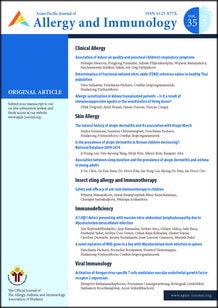
Safety and efficacy of ant rush immunotherapy in children (2017)
Title : Safety and efficacy of ant rush immunotherapy in children
Researcher : Clin.Prof.Suwat Benjaponpitak
Department : Faculty of Medicine, Siam University, Bangkok, Thailand
E-mail : med@siam.edu
Abstract : Background: The Rush Immunotherapy (RIT) protocol is a valid alternative in order to reach the maintenance phase early. However, there are scarce studies in the literature that have evaluated the safety and the efficacy of an ant RIT process in children.
Objective: To evaluate the safety and the efficacy of an ant RIT protocol and to identify the risk factors for systemic reactions (SRs) during an RIT procedure in children.
Method: A retrospective review was conducted for those children who were receiving an ant RIT procedure. The 3-day RIT protocol consisted of hourly subcutaneous injections in order to achieve a 0.5 ml maintenance dose of a 1:100 weight/ volume (wt/vol) of the Solenopsis invicta whole body extract. The safety for an RIT procedure was monitored by using the World Allergy Organization Subcutaneous Immunology Systemic Reaction Grading System. The efficacy was assessed by the reactions after a field ant re-sting.
Result: A total of 20 children who were receiving an ant RIT therapy were reviewed. The mean age was 9.5±3.07 years. There were 6 systemic reactions (SRs) from 324 injections during the RIT procedure (1.85%). All of the systemic reactions were Grade 1-2. There were no associations of SRs regarding age, gender, an atopic history, or the levels of immunoglobulin E (IgE) sensitization to the ants. Among the 14 patients who experienced a field ant re-sting, 4 (28.5%) patients developed Grade 3 SRs. These Grade 3 reactions were resolved after an increase of the maintenance dose to 0.5 ml of a 1:50 wt/vol. There was a significant difference in the mean age of those children who had ant re-sting systemic reactions and those who had no reactions (6.75±0.95 year vs. 10.8±3.29, p=0.036).
Conclusion: Rush immunotherapy with ant in children is safe and it has a low occurrence of severe systemic reactions. It is an alternative treatment for those patients requiring a rapid protection.
Link to Academic article: DOI: 10.12932/AP0831
Journal : Asian Pacific journal of allergy and immunology Vol. 35 No. 3 September 2017
Bibliography : Manuyakorn, W., Benjaponpitak, S., Kamchaisatian, W., Sasisakulporn, C., & Jotikasthira, W. (2017, September). Safety and efficacy of ant rush immunotherapy in children. Asian Pac J Allergy Immunol, 35(3), 156-160. doi: 10.12932/AP0831. PMID: 27996286.